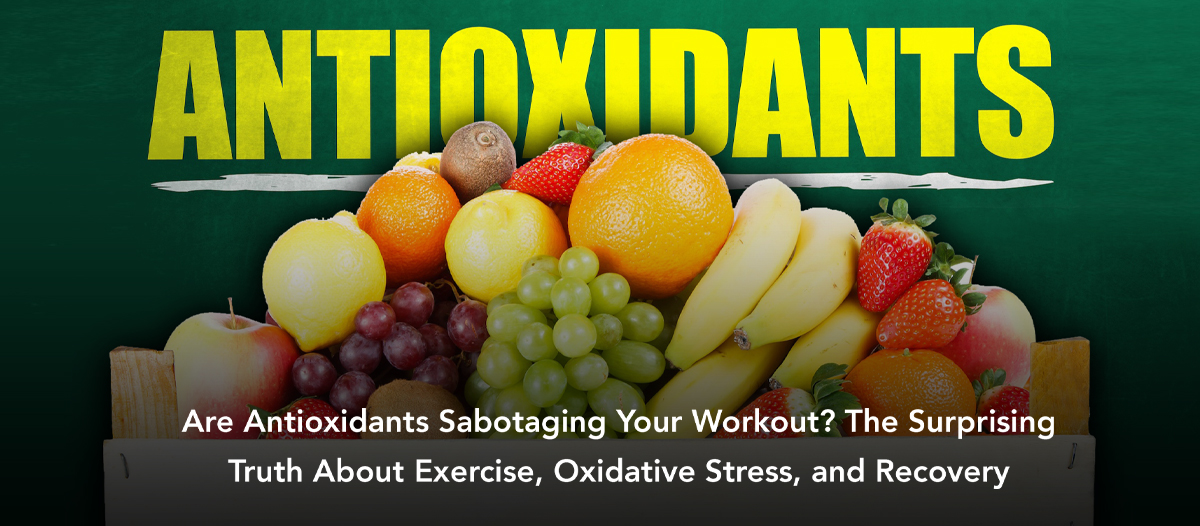Are Antioxidants Sabotaging Your Workout?
The Surprising Truth About Exercise, Oxidative Stress, and Recovery
by Mark J Kaylor
The Antioxidant Dilemma in Exercise Science
For years, we’ve been told that antioxidants are essential for health, helping to fight free radicals, slow aging, and prevent chronic disease. But what if taking antioxidants at the wrong time—especially around exercise—could actually reduce your workout benefits?
Many people load up on vitamin C, NAC, or other antioxidants to speed up recovery and reduce inflammation after exercise. However, emerging research suggests that this strategy may be counterproductive and could even blunt important adaptations that lead to better fitness, strength, and endurance.
Let’s break down the science and uncover when antioxidants help—and when they hurt—your exercise performance and longevity.
Oxidative Stress: Friend or Foe?
To understand why antioxidants might interfere with exercise benefits, we need to look at oxidative stress. Oxidative stress happens when there’s an imbalance between free radicals and antioxidants in the body.
🔹 The Traditional View: Free radicals = BAD, Antioxidants = GOOD
🔹 The Reality: Free radicals are essential signaling molecules that play a key role in adaptation, recovery, and mitochondrial function.
During exercise:
- Your muscles generate free radicals as a natural byproduct of energy metabolism.
- This oxidative stress signals your body to adapt, leading to stronger muscles, better endurance, and increased mitochondrial biogenesis.
- This process, called mitohormesis (a process where mild oxidative stress from exercise stimulates mitochondrial growth and adaptation, improving energy production and resilience), allows your body to become more resilient over time.
So what happens when you flood your system with antioxidants post-workout?
How Antioxidants Can Blunt Exercise Gains
While antioxidants protect against excessive oxidative damage, they also neutralize the beneficial oxidative stress signals that drive exercise adaptations. Research has found that:
✅ Vitamin C and E can reduce exercise-induced mitochondrial biogenesis.
- A 2009 study published in PNAS found that taking 1,000 mg of vitamin C and 400 IU of vitamin E daily prevented increases in insulin sensitivity and mitochondrial biogenesis in young men undergoing endurance training.
✅ N-acetylcysteine (NAC) can block muscle growth and endurance benefits.
- NAC is a powerful antioxidant that increases glutathione, the body’s master antioxidant. However, research in The Journal of Physiology found that NAC reduced muscle fatigue resistance, impairing endurance performance.
✅ Antioxidants can interfere with strength training adaptations.
- A study in The American Journal of Clinical Nutrition showed that vitamin C and E supplementation reduced gains in muscular strength after resistance training.
The Key Takeaway: Taking high-dose antioxidants too soon after exercise may disrupt the very signals that make training effective.
Which Antioxidants Are Less Likely to Interfere?
Not all antioxidants blunt exercise adaptations. Some actually enhance mitochondrial function and recovery without disrupting beneficial oxidative stress. These include:
1️- Astaxanthin – A lipid-soluble antioxidant that protects mitochondria without interfering with oxidative signaling.
2️ – Ergothioneine – A naturally occurring amino acid with a dedicated transport system, meaning it doesn’t overload cells with antioxidants.
3 – Sulforaphane – Found in cruciferous vegetables, this compound activates Nrf2, a pathway that helps balance oxidative stress without neutralizing it completely.
4️ – Coenzyme Q10 (CoQ10) and Ubiquinol – Supports mitochondrial function inside the electron transport chain without negating exercise-induced adaptations.
5️ – Polyphenols (Resveratrol, Fisetin, Quercetin, Curcumin) – These work through hormetic mechanisms (a biological phenomenon where mild stress, such as exercise or certain plant compounds, triggers beneficial adaptations that enhance health and longevity), supporting adaptation rather than blocking it.
How to Use Antioxidants Wisely for Exercise and Longevity
💡 DON’T: Take high-dose vitamin C, vitamin E, or NAC immediately before or after exercise if your goal is to improve fitness and longevity.
💡 DO: Allow some oxidative stress post-exercise to signal adaptation, then support recovery later with natural, food-based antioxidants.
💡 BEST PRACTICES: ✅ If supplementing, take polyphenols, astaxanthin, or CoQ10, which support mitochondrial health without interfering with adaptation. ✅ Time your antioxidant intake strategically – e.g., take vitamin C or NAC later in the day, away from workouts. ✅ Focus on whole foods – berries, leafy greens, and dark chocolate contain natural antioxidants that work in balance with the body.
Final Verdict: Do Antioxidants Harm or Help Exercise?
The answer depends on what, when, and how much you take.
🚀 If your goal is to build strength, endurance, or mitochondrial health, avoid high-dose vitamin C, vitamin E, and NAC immediately post-workout.
🥦 If you want long-term resilience and recovery, focus on whole-food antioxidants and strategic supplementation that supports rather than interferes with adaptation.
By understanding how oxidative stress works, you can harness the power of exercise adaptations while still protecting your body from excessive damage.
Mark J. Kaylor is a passionate advocate for holistic health and natural remedies, with a focus on extending both lifespan and healthspan. As the founder of the Radiant Health Project and host of Radiant Health Podcast, Mark blends in-depth research with traditional wisdom to empower others on their journey to vibrant health. Through his writing and speaking, he shares insights into the transformative power of herbs, nutrition, and lifestyle practices.
Disclaimer: All information and results stated here is for educational and entertainment purposes only. The information mentioned here is not specific medical advice for any individual and is not intended to be used for self-diagnosis or treatment. This content should not substitute medical advice from a health professional. Always consult your health practitioner regarding any health or medical conditions.




